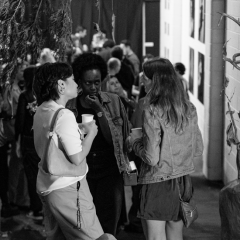To start, we’d love to know more about Counterpilot’s origins and its founding creative ethos. How did the collective come to be and what were some of the driving inspirations behind its formation?
Counterpilot has evolved from collaboration and the space between our various interests, skills and practices. A handful of artists kept orbiting each other, interested in creating performance work that activated audiences in new ways. There was always an ambition for technology to create intimate game-based experiences. Since 2014, we’ve distilled what we do into this really particular approach: we use technology to enrol audiences as the driving force in all of our work.
We love the term ‘techno-troublemakers’ and Counterpilot’s use of technology as an artistic device. In what ways does technology play a part in Counterpilot’s works, from initial conceptualisation to execution?
In a sense, technology is inescapable! We all have close personal relationships with media and technology in our day-to-day lives. It’s now so familiar to us that I think we tend to behave really authentically around technology – we don’t filter ourselves or pretend to be doing something we’re not when we interact with a device. Interacting with fictional characters in theatre can feel really artificial sometimes, but somehow things feel more real when it’s just you and a device.
We use the word trouble a lot because a cornerstone of our practice is this belief that good art should cause trouble. You should leave an arts experience with something in the status quo having shifted, or with dangerous questions being asked. Through our work – we hope to introduce a glimmer of mischief, or what we call “well-meaning chaos” into a world that takes a lot of things for granted.
Though still largely in a nascent phase, transmedia storytelling has the potential to revolutionise the way performance works are created and engaged with. Can you give us some examples of how Counterpilot has used technology to disrupt or enhance contemporary performance art in the past?
We have an unhealthy sense of ambition, so every new project usually involves something we’ve never played with before. In Spectate, there was a scene where every audience member
had a unique conversation with an unseen character via text messaging. In Truthmachine, an audience member gets hooked up to working biometric sensors which influence the responsive light and sound design. In IMB Institute of Light, we mapped a rainforest with 10,000 LED pixels and displayed real microscopic imagery at an enormous scale to celebrate the impact of scientific discovery. And in Adrift, we’re playing with immersive binaural audio design, so that your position in relation to a story shifts as you actively bring it to life.
Counterpilot was recently announced as Metro Arts’ Company in Residence for 2022-2023. What kinds of opportunities do programs like this offer independent artist collectives like Counterpilot?
This is really game changing for us. Working as an independent artist is fraught and precarious – it demands a lot from your time and energy, but with so little support or security. You always have to invent your own employment, and you do so at the bottom of the food chain in a system that’s always in some state of collapse. Working within Metro Arts means we can leverage the structure and stability of a larger organisation and shape our practice with real continuity. Putting artists on the payroll has to be a real consideration for the future of the arts sector. Because making art is real work, and it’s important work, not just for the sector, but for our society at large.
We hear that Counterpilot will present two new works – Adrift and Breaking – at Metro Arts this year as part of the program. We’d love to know more about both! Adrift seems to tackle themes of loneliness and isolation. Can you tell us a bit about how this work will take shape?
Adrift is an intimate theatre experience with no live performers. Strangers follow instructions through headphones to work together and co-create miniature table-top worlds. They’ll each hear part of a story, and collaborate to fill in the gaps for each other. Each of the true stories explores human loneliness in aquatic environments. The whole experience is set in a surreal global flood, and fuelled by feelings of isolation and climate anxiety. In this strange void, we have nothing left but to share stories with each other and hopefully remind ourselves how it feels to come together.
Breaking is an interactive digital-theatre work that can be performed and operated remotely to a potentially unlimited audience. What themes sit at the heart of this work and what does it look to convey about our screen-connected culture?
We started making Breaking during lockdowns as a way of exploring our tense relationship with news media in the midst of great tragedy. We also wanted to play with theatricality in an online space – looking to emphasise the liveness and unpredictability of an online encounter, but to pair that with dark and twisted stories. We’ve all spent a lot of time doom-scrolling, and forming strange intimate relationships with journalists who give us these regular reminders of just how bleak the world is out there. We asked ourselves whether we could make that fun?! Breaking challenges unrehearsed performers to be our bearers of bad news, by reading absurdly tragic headlines off an online teleprompter. They don’t get to read the script beforehand, so each performance will be its own little shared experiment in how to deliver blows to the nation.
What else can audiences look forward to from Counterpilot as we head into 2023?
We’ve got a few new projects in development for 2023, but perhaps the most exciting is a dangerously participatory work called Not a Cult* which will pop up in public spaces where it’s least expected. It might look like a cult and smell like a cult, but it’s not. We swear. It’s actually a playful satire of middle class Australian values that feels like a backyard barbecue meets religious ceremony. (*but look, we make no guarantee depending on how you define what is or isn’t a cult)
Finally, are there any newly emerging forms of technology that you’re eager to apply to a performance framework? What direction do you see transmedia storytelling moving in the coming years?
We’re excited by things that scare us, so we’re currently following the influences of artificial intelligence and machine learning systems in the arts space. We’re playing with some of these new technologies for projects in 2023, but always with a thrilling sense of concern! As for transmedia storytelling, it feels more and more intuitive that we all follow stories between forms and between platforms – in many cases, this is so normal that we’ve stopped pointing it out. It’s how we make sense of the world. Not from one source of information, but from the space between many sources. But in future, perhaps we’ll stop using traditional genre markers by default and embrace every new work as an experience in its own right. Not a film, or an audio book, or a work of theatre – but a story that could reach us through a limitless variety of personal encounters.
You can catch Counterpilot’s Adrift at the New Benner Theatre at at Metro Arts from November 9–19 and Breaking online between December 14–17.


